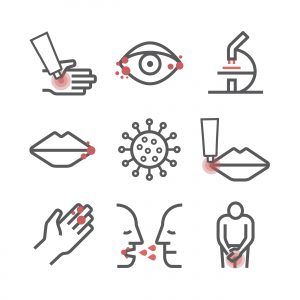The primary symptoms of herpes are small, painful sores that often form on the mouth, thighs, or genital regions. Other symptoms include discomfort during urination, achiness, or itchiness. (Learn More) Specific symptoms will depend on the type of herpesvirus present.
There are eight herpesviruses that generally affect humans: HSV-1, HSV-2, varicella-zoster virus, Epstein-Barr virus, CMV, HHV-6, HHV-7, and Kaposi sarcoma-associated herpesvirus. (Learn More)
Human simplex virus (HSV) type 1 and 2 are generally what we associate with herpes infections. They cause cold sores and mouth or genital herpes. HSV-1 is generally transferred orally and HSV-2 sexually, although oral sex can cause either virus to get to the mouth or genitals. (Learn More)
Varicella-zoster virus can cause chickenpox and shingles. It does not affect the body with the frequency HSV-1 and HSV-2 do, but shingles can be extremely painful and even dangerous. (Learn More)
Cytomegalovirus (CMV) is generally not harmful, except to unborn babies and people with compromised immune systems. It is very easily spread since many people are asymptomatic. (Learn More)
HHV-6 and HHV-7 are not very well understood. Like all of the above, they are transmitted via bodily fluids. Most people will have had these by age 5, never showing noticeable symptoms, although they can cause roseola infantum in babies. (Learn More)
Kaposi sarcoma-associated herpesvirus is also poorly understood. It is perhaps the rarest of the herpesviruses that affect humans and mostly associated with causing Kaposi sarcoma (a type of cancer) in patients with HIV. (Learn More)
Herpes Symptoms
Most often, when people talk about herpes, they are referring to HSV-1 (oral herpes) and HSV-2 (genital herpes). Symptoms include the following:
- Small, painful, red bumps or sores around the mouth, genitals, thighs, or anus
- Achiness
- Fatigue
- Itchiness
- Burning sensation or pain during urination
- Fever
- Chills
Depending on the type of herpesvirus present, symptoms may vary.
Oftentimes, herpesvirus is asymptomatic, meaning no symptoms are present. As a result, many people are unaware that they carry the virus.

What Are Herpesviruses?
While there are over 100 viruses in the herpesviruses family, there are specifically eight types of herpesviruses that routinely infect humans.
- Herpes simplex virus type 1 (HSV-1) / human herpesvirus 1 (HHV-1)
- Herpes simplex virus type 2 (HSV-2) / human herpesvirus 2 (HHV-2)
- Varicella-zoster virus / human herpesvirus 3 (HHV-3)
- Epstein-Barr virus / human herpesvirus 4 (HHV-4)
- Cytomegalovirus (CMV) / human herpesvirus 5 (HHV-5)
- Human herpesvirus 6 (HHV-6)
- Human herpesvirus 7 (HHV-7)
- Kaposi sarcoma–associated herpesvirus / human herpesvirus 8 (HHV-8)
The herpes viruses cause herpes infections.
Depending on the nature of the virus, infections can manifest as cold sores, blisters, and even worse things like eye damage. In the case of some, like Varicella-zoster virus, the symptoms might be quite painful and even dangerous.
Herpes cannot be cured. However, its symptoms can be treated with medications that are able to lessen the rate and strength of outbreaks, so they are less painful and dangerous.
Herpes can spread easily. Always consult a doctor about how your condition spreads and do not assume being on medication means you cannot spread the virus.
HSV-1 and HSV-2
HSV-1 is transmitted mostly through oral-to-oral contact, although it can transmit to the genitals via oral sex. It can cause cold sores on the affected area, leading to mouth or genital herpes. Some people who carry HSV-1 experience no or very mild symptoms, and they may not even notice they are infected. This can unfortunately lead to them easily spreading the condition.
HSV-2 is transmitted sexually, usually leading to genital herpes. It can infect the mouth through oral sex.
It has very similar symptoms to HSV-1, and both of these conditions are quite common. It was estimated that in 2015 to 2016, 47.8 percent of Americans were infected with HSV-1 and 11.9 percent were infected with HSV-2.
Herpes simplex virus tends to be very manageable but there are a few things to consider. It can be spread to babies during childbirth, and HSV-1 can transfer to children relatively easily through day-to-day activities. If herpes gets into the eye, it can cause serious vision problems (ocular herpes) if left untreated. If you have a weakened immune system, herpes can be more dangerous as your body has a harder time fighting the infection.
Varicella-Zoster Virus Symptoms

Varicella-zoster virus causes chickenpox and herpes zoster, which is more commonly called shingles. While chickenpox is uncomfortable and can easily spread, it is herpes zoster that can be fairly dangerous, causing pain, tingling, or burning at first, eventually leading to rashes that can be extremely painful.
The following are other symptoms:
- Fever
- Chills
- Headache
- Joint pain
- Swollen glands
If it affects the face, it may also cause the following:
- Difficulty moving face muscles
- Drooping eyelid
- Hearing loss
- Loss of eye motion
- Taste problems
- Vision problems
If you have chickenpox when you are young, you have been infected with varicella-zoster virus, which will lie dormant in your body. This makes it possible, but does not guarantee, that you will be infected with shingles. This is more likely to happen if you have a weakened immune system, are over 65, or were infected with chickenpox before the age of 1.
Varicella-zoster virus is usually very obvious when it is able to spread. If someone shows symptoms of chickenpox or shingles, assume they could be contagious unless told otherwise by a doctor.
There are vaccines for both chickenpox and shingles. If you are older, talk to your doctor about protecting yourself from shingles.
Symptoms of Epstein-Barr Virus
Epstein-Barr virus is a relatively common virus that most people will be infected with at some point in their lives. It spreads through bodily fluids, mostly saliva, although it can also transmit through other fluids, such as blood or semen. The virus can be spread while active in the body, even if symptoms are not showing.
 Symptoms include the following:
Symptoms include the following:
- Fatigue
- Fever
- Inflammation in the throat
- Swollen lymph nodes in the neck
- Enlarged spleen
- Swelling in the liver
- Rash
Most people experience symptoms for about two to three weeks while Epstein-Barr is active in the body, although fatigue may sometimes last months.
Cytomegalovirus
Cytomegalovirus (CMV) is a common virus. Nearly one in three children is already infected with CMV by age 5 in the United States. Over half of adults will eventually be infected with CMV.
Most people who are infected show no symptoms. A healthy immune system can fight CMV fairly effectively.
CMV is most dangerous for people with weakened immune systems and unborn babies. In these groups, their bodies are vulnerable to serious complications. It can affect the development of fetuses. Those with compromised immune systems, such as those with HIV, may experience serious problems in the eyes, lungs, liver, esophagus, stomach, and intestines.
CMV is spread through bodily fluids. Notably, this can be an issue with the saliva or urine of babies and young children, breastmilk, and during organ transplants.
HHV-6 and HHV-7
Human herpesvirus 6 and 7 are not well understood and warrant further research. By age 5, most people will have antibodies for these, having never otherwise shown signs they were affected.
They are known to be connected to kidney rejection and to sometimes cause roseola infantum, a disease that almost exclusively affects infants ages 6 months to 3 years. Roseola infantum causes a high fever and febrile seizures, with further complications possible. The child may develop a rash on the chest and abdomen, although not always.
Treatment of roseola infantum is symptomatic. Doctors will make sure the child is comfortable and as safe as possible until symptoms pass. While it can be fatal, this is rare.
Kaposi Sarcoma-Associated Herpesvirus
The final member of the herpesvirus family generally associated with humans is HHV-8 or Kaposi sarcoma-associated herpesvirus. This virus is not well understood, but it is known to cause cancer in HIV-infected untreated individuals.
Unlike all of the above, HHV-8 is rare in the general population. Like many herpesviruses, it is spread through bodily fluids, including sexual contact.
It is associated with Kaposi’s sarcoma in AIDS patients as well as with intraabdominal solid tumors. It’s debated how it causes this and if it can increase the risk of other diseases.
See a Doctor
If you notice any potential symptoms of herpes, such as blisters, cold sores, or other skin issues, see a doctor promptly. Once you have been properly diagnosed, you can start treatment that can reduce the frequency and severity of your outbreaks.
References
Genital Herpes. (November 2, 2018). MedlinePlus.
Herpes Simplex. (November 2, 2018). MedlinePlus.
Herpes – Oral. (August 26, 2018). MedlinePlus.
Shingles. (December 1, 2018). MedlinePlus.
Cytomegalovirus (CMV) and Congenital CMV Infection. (June 6, 2018). Centers for Disease Control and Prevention (CDC).
Herpesviruses. (1996). Medical Microbiology, 4th Edition.
Overview of Herpesvirus Infections. (February 2018). Merck Sharp & Dohme Corporation.
Herpes Simplex Virus. (January 31, 2017). World Health Organization (WHO).
Prevalence of Herpes Simplex Virus Type 1 and Type 2 in Persons Aged 14–49: United States, 2015–2016. (February 2018). Centers for Disease Control and Prevention (CDC).
About Epstein-Barr Virus (EBV). (May 8, 2018). Centers for Disease Control and Prevention (CDC).
Roseola Infantum. (January 2018). Merck Sharp & Dohme Corporation.
Kaposi’s Sarcoma Herpesvirus/ Human Herpesvirus-8 (KSHV/HHV8), and the Oncogenesis of Kaposi’s Sarcoma. (January 21, 2018). Nature Reviews Cancer.
Spectrum of Kaposi’s Sarcoma-Associated Herpesvirus, or Human Herpesvirus 8, Diseases. (July 2002). Clinical Microbiology Reviews.
















